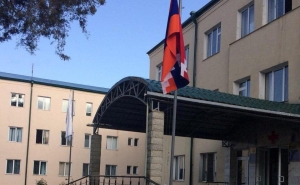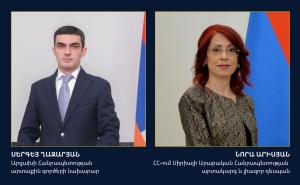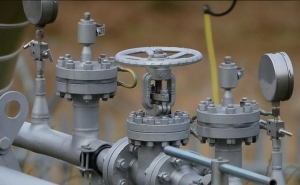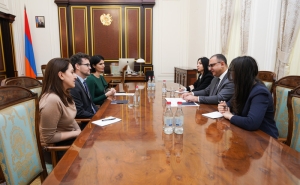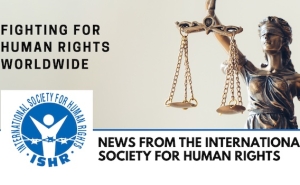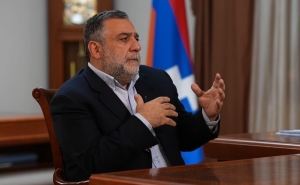The Wife of "Bekor Ashot" on War and Peace
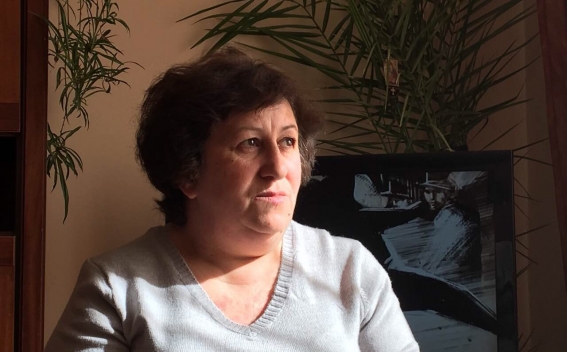
"Armedia" IAA presents an EXCLUSIVE interview with Nelly Ghulyan, the wife of the hero of Artsakh war, Bekor Ashot (Ashot Ghulyan). The interview was taken within the framework of the program "Stressing the role of women in Armenia and Nagorno-Karabakh in peacemaking and conflict resolution through media and art", which was carried out by NGO"Society without Violence", with the support of the Black Sea Regional Cooperation Foundation.
- A lot is said about war, many books are already written and are still being written, but what does war mean for you, for a woman?
- Catastrophe, cruelty, I can say, anxiety, a very bad thing. This conflict for my family began a little earlier. Probably, earlier than in 1988, when secret detachments were being created here, in which my husband took an active part. We did not believe in the Movement of the 80s, because in the 60's our Movement was suppressed. History has consistently shown that our movement was suppressed by the Turks, the Russians. When Ashot was away from home for a long time, I asked him: "What do you think should happen?" Once Ashot answered: "There will be a war."
Probably, from that time on everything changed inside me. First of all, there was a concern about my family, as our first child was already born, and I was expecting the second one. I was thinking all the time…We knew about war only from the Patriotic War, from books, films, newspapers, and when all this arose before my eyes, I did not tolerate such pictures. But, what could we do?! As the Armenian history showed, in such difficult times, a woman always took up arms and stood next to her man, she became a supporter in everything and inspired her husband. That's the way not only me, but all the women of Artsakh got involved in the war… (went into tears - ed.).
Following the example of Armenian women known in history, women's special groups were created here. Some of them, who had the opportunity to do so, even left their families, took up arms and fought shoulder to shoulder with men. Some of them died, the others are still alive. When we talked about this with my husband, he replied that women should stay at home, bring up their children and wait for their husbands. And that's what I did. When they started bombing from Shushi, we moved to the village of Khndzoristan, not far from Stepanakert, where my father and Ashot were born. Ashot moved there earlier, away from the eyes of OMON and the Russian army. There he became illegally engaged in the production of weapons, so he had to take us to the village. When we moved, our second child was already born. Another life began in the village. Occasionally they gathered together and Ashot taught the guys to make weapons, prepare explosives. At that time, my role was to welcome those guys, take care of them, feed them, wash their clothes if necessary, and wait for my husband to come home and spend several hours with our children. So it all continued this way until his death.
- And what does peace mean for you?
- (She’s thinking - ed.) Peace means everything to me. The condition of the present relative peace is the greatest happiness for us, the Artsakh people. Despite the fact that we were always, to some extent, confident that large-scale actions like those of the 90s will not repeat, nevertheless, the time, the April war showed that we were wrong. We should always be afraid of the Turks, be always vigilant, because the Turks do not forget anything...
- According to you, what is the role of women during wartime?
- A woman should be engaged in her own business, take care of home and children, be a supporter and inspire her husband. Since the beginning of the 1990s, when more widespread military operations began, and the population was evacuated from Martakert, as well as from other border regions, I could not tell Ashot to take us too, or something like that. That's what happened once. Ashot came and saw that I was gathering winter clothes, looked at me strangely and asked what I was doing. Then without waiting for my answer, he said that his family must stay there and live there. Ashot's family house was in the upper part of the village and all the other houses as well were clearly visible for us. He pointed to their side and said that people in all those houses look at the light of our house. If they see that the light goes out, then they will all lose their hope. And so he did not take us out of the village. When the planes arrived and bombed, we stayed at home, when they shot from Agdam, the shells reached our field. At such moments my elder son, who was 5 years old then, used to shout: "The plane, the plane!" - and we all fled to the basement. These planes became so regular that one day the child stood up and shouted: "Fuck the plane! I do not want to go to the basement, let it be what will be!" Later, after Ashot's death, we moved to Yerevan, as the third child was on its way (smiles - ed.).
- What did you feel during the war, when you stayed at home with your children?
- Honestly, the whole village felt good, when Ashot was there. And I felt calm. There was no special fear in me. During the whole war I was afraid only when Shushi was to be taken, because there was a chaos among the villagers. In the village, there were about 5,000 inhabitants. Our village was in a safer place, and people came to us from different regions, from Agdam and other places. Unusual fear was felt on May 7-8, when all of us were forced to go down to the basement, to a safer place.
- Have you ever tried to stop your husband when he left the house again?
- Of course, any woman would say that she wanted her husband to stay with her at home. (Smiling - Ed.) Of course, his answer was negative, he said: "How can I stay? After all, this is done for you!" My eldest son was born in 1986. In the 87th, when I took the child out for a walk, I heard speeches around us in Turkish (Azerbaijani - ed.). Near the university there were many Turkish students. They came from different regions, fell in love with Stepanakert and did not want to leave. That was the policy of Aliyev-father to fill Stepanakert with the youth (Azerbaijani - ed.). My husband then said that it had already begun and we must bring the matter to an end. I remember our parents and other aged people to ask skeptically what we could do. They said that they tried it more than once, but each time they were repressed. Then they realized that our guys were really standing firm this time.
- What is the role of women in creating peace?
- I think that a woman should take an active part in both political and public life. Whoever has an opportunity, should contribute to the preservation and development of freedom, achieved with great difficulties. That's what happened to me. My younger son was 5 years old, when I was offered a job in a kindergarten. To tell the truth, when I was a child, I did not like kindergarten at all. When Ashot moved us to the village, I constantly asked what I could do in the village as I had been studying at the university for 5 years. And he answered: you love children very much, so you will start to lead a kindergarten, as if he had a premonition. Ashot was no longer with us, when in 1998 I was offered to become the head of a kindergarten. Then I became a member of the NGO "Armenian Relief Alliance", and today I continue to work there. Twice I was elected to the community council, using my knowledge, skills, doing everything I could for the welfare of our population.
- Why did you agree to become the head of the kindergarten?
- I have pedagogical education. I really like children very much, and this was the main reason, despite the fact that in the beginning I did not understand anything about the arrangement of the kindergarten. Then I gradually learned, and it is already 18 years I have been working there.
- What difficulties have you faced during these 18 years?
- There were always difficulties. Humans should look at everything calmly. I was the one who was satisfied with everything I had. I was just content with what I had, and, thanks God! I learned everything in the village. I even started to make butter and cheese.
- Taking into consideration the difficulties you went through, what was your main advice to your children?
- The main advice I gave my children is to be honest in life. Their father was very honest, loving his homeland. I commanded the children to hold high the honor of their father. I have three sons and it seems to me that I raised good people.
- Is it difficult to be the mother of three boys?
- It's veeeery, very difficult (laughs- ed’s). Especially during school years. I remember that after the war we went to Yerevan. And disputes often arose between my sons and local guys. I heard their voices, restrained my tears, but did not go out into the yard telling myself: let them learn to defend themselves!
Let me say that the April war was much worse for me. After 25 years, when my sons are already grown up and two of them serve in the army as officers. One of them is a mayor, and the other is a military doctor. The war again touched them both directly. On April 2-3, the birth of our grandson was expected, the youngest one of all my grandchildren. But the kid turned out to be very smart and was born on March 26. The war very badly reflected on my daughter-in-law who had just given birth, and did not know where her husband was. And I did not know what to do, and just was nearby and helped her.
I remember, when the war broke out, it was Saturday. And the real hell began until April 5th. Despite the fact that a truce was established, there was a fear that there would be an attack again in early May. These days, even though I encouraged everyone, something burned me from inside.
- What were the main difficulties of the 90's?
- The main difficulties of those years were social ones. The shelves of the shops were empty, people were getting in line to buy something. My son was 4-5 years old, and he did not have trousers, because there were no trousers in stores. Children's food was brought from Moscow. But we did not think about anything, we just wanted the war to end soon.
There were many young women who lost their husbands in war, and who did not even have time to register their marriage at the registry office. Some of them then remarried, which I applaud. They had children with their second husbands, but their husbands also took care of the children from the first marriage of these women whose husbands died in the war. Everyone did what they could, but there was no begging. In those years there was no orphanage in Artsakh.
- Will you, please, share the story of your family?
- My parents and Ashot’s parents were from the same village. Ashot's mother died early. Their family lived in Baku. To support his four children (Ashot and his three sisters), Ashot's father moved to Stepanakert, exchanging his house with the Azerbaijanis living in Stepanakert. Then Ashot's father married again and moved to live with this woman in her village. Ashot, after the death of his mother, unable to get along with his stepmother, remained in Stepanakert with his sisters. Ashot, who was only 17 years old and was the eldest of the children, took care of the sisters alone. My father's family, at the request of my father-in-law, also cared about Ashot and his sisters. And thus we met each other. I studied in Yerevan, and could make my choice there (smiles - ed.), but that was my destiny. In 1985, we married, in 1986 our first child was born, and already in 1987 the Movement began. At that time we did not see Ashot at home. 3-4 times he was wounded, when testing the weapon. But, wherever he was, he certainly returned on the birthdays of the children. Ashot was no longer with us, when our youngest son was born in 1992. His name is Bekor. That's how I raised our sons, and today each of them has his own family.
- What is the choice of the profession of your sons determined by?
- To tell you the truth, when they realized how difficult it was, it was too late (laughs, ed.). The eldest son graduated from military school of Artsakh, then the Military Institute named after Vazgen Sargsyan. It is already more than 10 years he serves in the army. Like his father, he is very gentle and loves his soldiers very much. Our second son studied in Greece, as a military doctor. He said: "Either this, or I will not study at all." He is the naughtiest one of my sons (laughs - ed.). They are all very modest and never say, who their father is. In many cases, I was hampered by the fact that I was Ashot's wife (laughs - ed.). For example, when we hired tutors, they did not want to take money from us.
- What do you consider your greatest achievement in life?
- My greatest achievement is my family, my children, who I managed to help achieve something in life. In this case, everything else, any social activities and so on, are going to the second plan…
Other materials on this subject
- Russian forces have clearly failed in their duties: senators press Biden Administration to break Azerbaijan’s blockade The United States cannot stand aside while the Aliyev regime callously threatens the lives of Nagorno-Karabakh’s citizens, and must hold Azerbaijan to account for blocking a civilian population’s access...
- US calls for the full restoration of free movement through the Lachin Corridor "We remain concerned about impeded access to the Lachin Corridor and the humanitarian implications of this situation. This sets back the peace process and undermines international confidence. We call for...
- Azerbaijani forces violate the ceasefire in Artsakh The ceasefire violation was reported to the command of the Russian peacekeeping troops.
- Azerbaijani units violate ceasefire in several directions, Artsakh’s Defense Ministry says The Armenian side has no losses. The incidents of ceasefire violations were reported to the command of the Russian peacekeeping troops.
- Russian Diplomat Reassures Armenians Over Corridor In Karabakh "The parties are in direct contact, and I assure you that the peacekeepers will not move a single centimeter until there is a new corridor," Seleznyov said.
-
 17:08
17:08The regular session of the Anti-corruption Policy Council takes place in Jermuk
-
 15:05
15:05The Prime Minister sends congratulatory messages to the supreme leader of Iran and the President of Iran
-
 11:11
11:11Armenia sends earthquake aid to Turkey
-
 10:43
10:43Commemoration of the Pontiff St. Sahak Partev
-
 09:16
09:16Some roads are closed and difficult to pass in Armenia
-
 19:55
19:55Phone conversation of the Foreign Minister of Armenia with the U.S. Assistant Secretary of State for European and Eurasian Affairs
-
 18:30
18:30Prime Minister Pashinyan and President Khachaturyan meet
-
 18:20
18:20Ararat Mirzoyan with Co-Chairman of the OSCE Minsk Group of France Brice Roquefeuil
-
 17:01
17:01Humans could land on Mars within 10 years, Musk predicts
-
 16:45
16:45France, US urge 'immediate' end to Nagorno Karabakh blockade
-
 16:01
16:01Blockaded Nagorno Karabakh launches fundraiser to support quake-hit Syria
-
 15:59
15:59Earthquake death toll in Turkey rises to 18,342
-
 15:43
15:43Ararat Mirzoyan Held a Telephone Conversation with Sergey Lavrov
-
 15:06
15:06French president rules out fighter jet supplies to Ukraine in near future
-
 14:47
14:475 Day Weather Forecast in Armenia
-
 14:44
14:44President Vahagn Khachaturyan wrote a note in the book of condolences opened in the Embassy of Syria in Armenia
-
 14:20
14:20Azerbaijan’s provocations impede establishment of peace and stability – Armenian FM tells Russian Co-Chair of OSCE MG
-
 12:57
12:57France representation to OSCE: Paris calls on Azerbaijan to restore freedom of movement through Lachin corridor
-
 11:40
11:40Command of Kosovo forces highly appreciated preparation of Armenian peacekeepers
-
 10:16
10:16The United States withdrew from sanctions against Syria for six months the provision of assistance after the earthquake
day
week
month
Humidity: %
Wind: km/h



